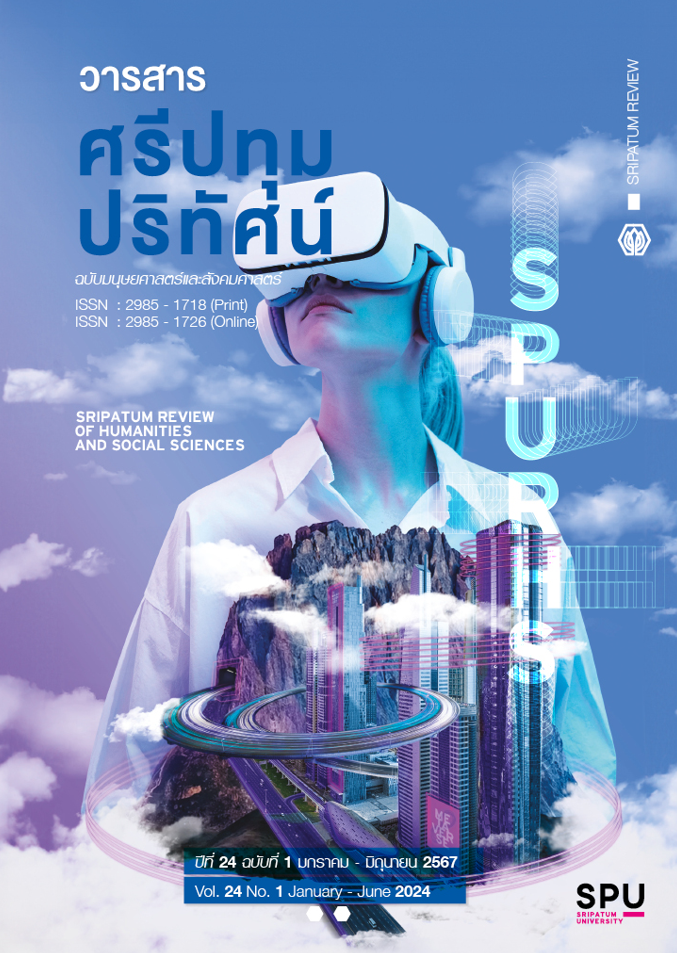การพัฒนาบอร์ดเกมเพื่อส่งเสริมทักษะสมอง EF ของเด็กวัยเรียน
Main Article Content
บทคัดย่อ
การวิจัยครั้งนี้มีวัตถุประสงค์ (1) เพื่อพัฒนาบอร์ดเกมในการส่งเสริมทักษะสมอง EF ของเด็ก
วัยเรียน และ (2) เพื่อศึกษาผลการใช้บอร์ดเกมในการส่งเสริมทักษะสมอง EF ของเด็กวัยเรียน กลุ่มตัวอย่าง คือ นักเรียนอนุบาลและประถมศึกษา จำนวน 205 คน และครูอนุบาลและประถมศึกษา จำนวน 40 คน
ของโรงเรียนสาธิตละอออุทิศ กรุงเทพมหานคร ที่ได้มาจากการสุ่มแบบแบ่งกลุ่ม (Cluster Random Sampling) เครื่องมือที่ใช้ในการวิจัย ประกอบด้วย (1) บอร์ดเกมในการส่งเสริมทักษะสมอง EF
ของเด็กวัยเรียน จำนวน 6 เกม (2) แบบประเมินบอร์ดเกมในการส่งเสริมทักษะสมอง EF ของเด็กวัยเรียน
(3) แบบประเมินทักษะสมอง EF ของเด็กวัยเรียน และ (4) แบบประเมินความพึงพอใจของครูที่มีต่อการใช้บอร์ดเกม สถิติที่ใช้ในการวิเคราะห์ข้อมูล ประกอบด้วยสถิติพื้นฐาน ได้แก่ ค่าคะแนนเฉลี่ย (Mean)
ค่าส่วนเบี่ยงเบนมาตรฐาน (Standard Deviation) และสถิติอ้างอิง คือ t-test แบบ Dependent ผลการวิจัย พบว่า ภาพรวมของบอร์ดเกมในการส่งเสริมทักษะสมอง EF มีความเหมาะสมอยู่ในระดับมากที่สุด
ผลการเปรียบเทียบทักษะสมอง EF ของเด็กวัยเรียนก่อนและหลังการใช้บอร์ดเกมมีความแตกต่างกันอย่างมีนัยสำคัญที่ระดับ .01 (t = -29.23, p=.00) โดยหลังการใช้บอร์ดเกมเด็กวัยเรียนแสดงพฤติกรรมทักษะสมอง EF สูงกว่าก่อนการใช้บอร์ดเกม และครูมีความพึงพอใจต่อการใช้บอร์ดเกมเพื่อส่งเสริมทักษะสมอง (EF)
ของเด็กวัยเรียน ภาพรวมอยู่ในระดับเหมาะสมมากที่สุด ทั้ง 6 เกม
Article Details

อนุญาตภายใต้เงื่อนไข Creative Commons Attribution-NonCommercial-NoDerivatives 4.0 International License.
1. กองบรรณาธิการสงวนสิทธิ์ในการพิจารณาและตัดสินการตีพิมพ์บทความในวารสาร
2. บทความทุกเรื่องจะได้รับการตรวจสอบทางวิชาการโดยผู้ทรงคุณวุฒิ แต่ข้อความและเนื้อหาในบทความที่ตีพิมพ์เป็นความรับผิดชอบของผู้เขียนแต่เพียงผู้เดียว มิใช่ความคิดเห็นและความรับผิดชอบของมหาวิทยาลัยศรีปทุม
3.การคัดลอกอ้างอิงต้องดำเนินการตามการปฏิบัติในหมู่นักวิชาการโดยทั่วไป และสอดคล้องกับกฎหมายที่เกี่ยวข้อง
เอกสารอ้างอิง
Amarin Baby & Kids. (2022). Benefits of Board Games for children. [Online]. Retrieved
December 23, 2023, from: https://www.amarinbabyandkids.com/kids/benefits-of-
board-games-for-kid
Chutabhakdikul, N.; Thanasetkorn, P.; Lertawasdatrakul, O.; Ruksee, N. (2015). Tool
development and evaluation criteria for assessment of executive function in early
childhood. Bangkok: Institute of Molecular Biosciences. Mahidol University. (in Thai)
Gilbert, S.J., & Burgess, P.W. (2008). Executive Function. Current Biology, 18(3): 110-114.
Hanmethi, S., Pitaksinsuk, T., & Aramrid, P. (2018). Kindergarten school Teacher Handbook:
Executive function Development. Bangkok: Matichon public company limited.
(in Thai)
Harnkajornsuk, S. (2021). Development of Board Games for Enhancing Executive functions in
Young Children. Journal of Humanities and Social Sciences, Rajapruk
University, 7(Special), 191–202. Retrieved from https://so03.tcithaijo.org/index.php/rpu/article/view/257381. (in Thai)
Hinebaugh, J. P. (2009). A Board Game Education. Plymouth: Rowman & Littlefield
Education.
Horadal, A. (2019). Brain-Based Learning for Young Children. Kasetsart Educational Review,
(2), 1-10. https://so04.tci-thaijo.org/index.php/eduku/article/view/175748/167142.
(in Thai)
Play Academy Thailand. (2017). Board Game for Enhancing Executive Functions. [Online].
Retrieved December 23, 2023, from: www.facebook.com/PlayAcademyTH/ posts/1288519341203435/.
Reamkidkarn, K. and Chumchua, V. (2019). Impact of Family Card Board Game
to Increase Attention and Reduce Inattention, Impulsivity and Hyperactivity in
Children with ADHD. Journal of Psychiatr Assoc Thailand, 64(3), 217-234.
https://www.psychiatry.or.th/JOURNAL/64-3/02_Kamonpot.pdf. (in Thai)
Rubun, P. and Puntaeak, S. (2022). The effect of using board game for young children:
Community unit through executive functioning skills in Anubarn Kalasin school Muang
Kalasin district, Kalasin. Journal of Education Yala Rajabhat University, 1(1), 29-43.
https://so08.tci-thaijo.org/index.php/jeduyru/article/download/392/461. (in Thai)
Saengsawang, T.; Langka, W.; Utairatanakit, D. and Semheng, S. (2016). A development of
executive function skills indicators for elementary students. BU Academic Review,
(1), 14-28. https://so01.tci-thaijo.org/index.php/buacademicreview/article/view/80662/64239. (in Thai)
Thepphuthorn, T.; Pattanasith, S.; and Srifa, P. (2022). The development of augmented reality
technology educational boardgame for game base learning to promote learning
achievement of prathomsuksa 3 students. Journal of Educational Measurement,
(105), 64-75. https://eptb.swu.ac.th/jemeptb_vol-38-105/. (in Thai)
Thonglon, S.; Sirithadakunlaphat, S. and Haenjohn, J. (2022). The Effect of Mindfulness
Combined with Board Games Training Program to Enhance Executive Functions and
Reduce Inattention in Children with Attention-Deficit Hyperactivity Disorder. Journal of Research and Development in Special Education, 11(2), 51-65. https://ejournals.swu.ac.th/index.php/rise/article/view/15137. (in Thai)
Wetworanan, R. (2020). Game-based learning: GBL. [Online]. Retrieved December 23, 2023,


